A function that calls itself is known as a recursive function. And, this technique is known as recursion.
How recursion works?
void recurse()
{
... .. ...
recurse();
... .. ...
}
int main()
{
... .. ...
recurse();
... .. ...
}

The recursion continues until some condition is met to prevent it.
To prevent infinite recursion, if...else statement (or similar approach) can be used where one branch makes the recursive call and other doesn't.
Example: Sum of Natural Numbers Using Recursion
#include <stdio.h>
int sum(int n);
int main()
{
int number, result;
printf("Enter a positive integer: ");
scanf("%d", &number);
result = sum(number);
printf("sum=%d", result);
}
int sum(int num)
{
if (num!=0)
return num + sum(num-1); // sum() function calls itself
else
return num;
}
Output
Enter a positive integer: 3 6
Initially, the
sum() is called from the main() function with number passed as an argument.
Suppose, the value of num is 3 initially. During next function call, 2 is passed to the
sum()function. This process continues until num is equal to 0.
When num is equal to 0, the if condition fails and the else part is executed returning the sum of integers to the
main() function.
Advantages and Disadvantages of Recursion
Recursion makes program elegant and cleaner. All algorithms can be defined recursively which makes it easier to visualize and prove.
If the speed of the program is vital then, you should avoid using recursion. Recursions use more memory and are generally slow. Instead, you can use loop.
No comments:
Post a Comment